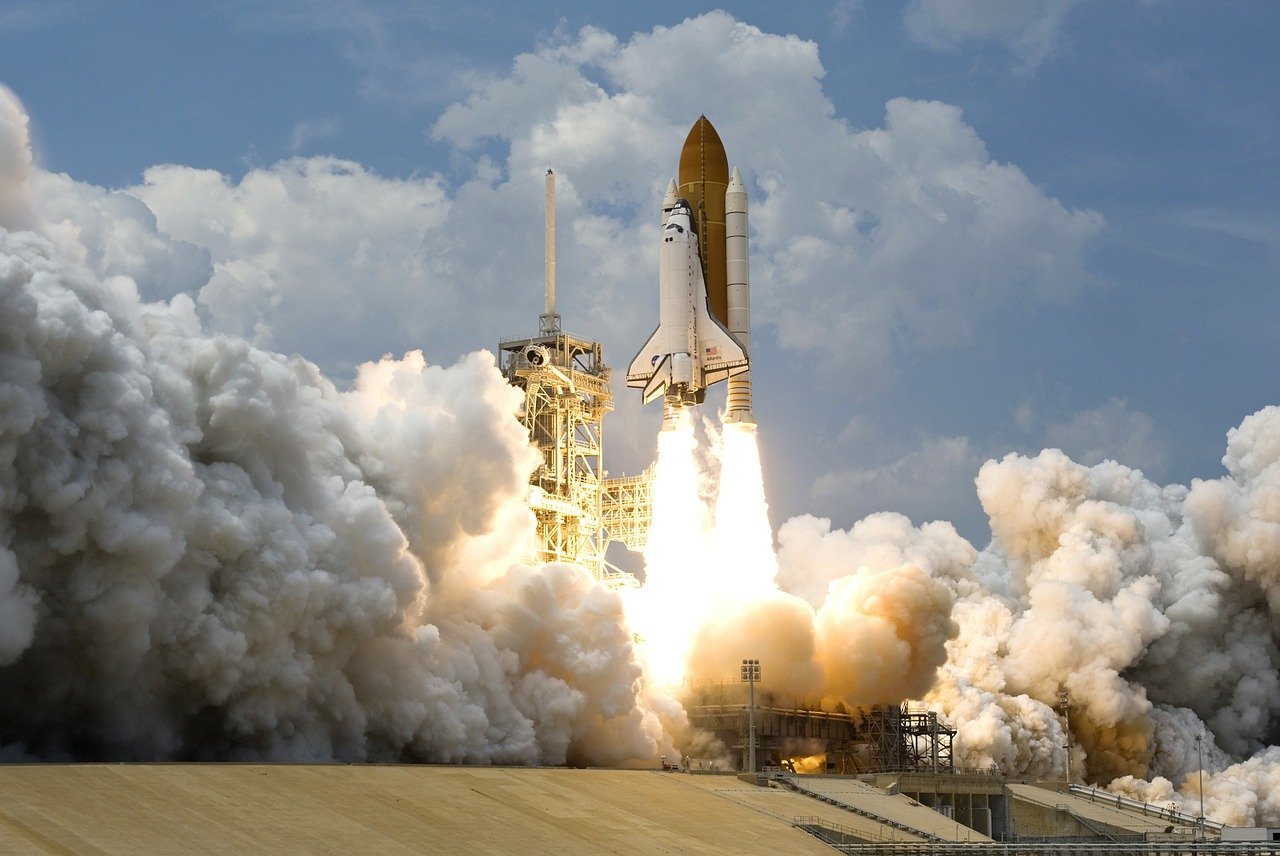Table of Contents
While Blue Origin and SpaceX democratize access to space, small businesses can explore several promising new ideas that lie beyond the planet Earth.
How Jeff Bezos and Elon Musk : new era of space startups
In early February, Jeff Bezos, the founder of Amazon and one of the richest entrepreneurs on the planet, gave the bombshell announcement that he would resign as CEO to devote more time to his other passions. Although Bezos listed some goals for his creativity and energy – the Washington Post and philanthropy through the Bezos Earth Fund and the Bezos Day One Fund – one of the areas with the highest potential is his renewed commitment to his suborbital space flight project, Blue Origin. Before space became a frontier for innovation and the development of private companies, opportunities were limited to national states and private contractors supporting them. In recent years, however, billionaires such as Jeff Bezos, Elon Musk, and Richard Branson have lowered the entry barrier, paving the way for a new generation of space startups. Since the launch of its first rocket, Falcon 1, in September 2008, Musk’s space transport company SpaceX has gradually but significantly reduced the cost and complexity of innovation beyond the Earth’s atmosphere. With the announcement of Bezos, many in the space sector are excited by the prospect of these barriers being lowered further, creating a new wave of innovation.
“What I want to achieve with Blue Origin is to build the infrastructure that allows the kind of dynamic and entrepreneurial explosion of thousands of companies in space that I’ve seen over the past 21 years on the Internet”, said Bezos during the Vanity Fair New Establishment Summit in 2016. During the event, Bezos explained how the creation of Amazon was only possible thanks to the billions of dollars spent in critical infrastructures – such as the postal service, electronic payment systems, and the internet itself – in previous decades. “On the Internet today, two guys in their dorm room can reinvent an industry, because there is an infrastructure that allows it”, he continued. “Two guys in their dorm can’t do anything interesting in space… I am using my earnings from Amazon to make a new type of infrastructure, which is cheap access to space“. In less than 20 years since the launch of SpaceX’s first rocket, space has shifted from a domain reserved for national states and the world’s richest individuals to innovators and everyday entrepreneurs.
The next frontier of entrepreneurship
According to the latest Space Investment Quarterly report published by Space Capital, the fourth quarter of 2020 saw a record of $5.7 billion invested in 80 space-related companies, bringing the total annual capital investment in space innovation to more than $25 billion. Overall, more than $177 billion in equity investments have been made in 1,343 individual space economy companies over the past 10 years.
“It’s crazy how quickly things have escalated; 10 years ago, when SpaceX launched its first client, it removed barriers to entry, and we saw all this innovation and the influx of capital”, says Chad Anderson, the managing partner of Space Capital. “We’re on an exponential curve. Every week that passes we are increasing the pace“.
Anderson says that Space Capital’s $75 million seed-stage fund focuses on three areas of development in space economics, primarily around the collection and use of data collected in space: GPS, space intelligence, and communications. Although it may sound like science fiction, Anderson says that the progress made by SpaceX and the vision outlined by Bezos with Blue Origin suggests that the new frontier could be open to innovation sooner than most people expect.
“This frontier market stuff is a bit further away, but it’s a lot closer than most people think,” he says. ” SpaceX will be able to go to the moon much sooner than you think, and they’re still aiming to go to Mars within four and a half years, so it’s really interesting stuff”.
Will Bezos play well with the others?
Anderson’s expectations for Blue Origin, however, are somewhat less than his optimism of SpaceX’s progress, as the former has yet to successfully launch a vehicle into orbit. While the Musk company works closely with NASA and many small startups and collaborators and has demonstrated a commitment to transparency and collaboration, the Bezos company is largely operating under a veil of secrecy, collaborating only with large contractors and giving priority to self-sufficiency over collaboration.
“Their approach to this is to do it all by themselves; they’re building their launch vehicles, they’re talking about building their space station, they’re very vertically integrated”, Anderson says.
Many in the space industry attribute this to a difference in mentality. Musk, the Silicon Valley entrepreneur behind Tesla, Boring Company, Openai and Neurolink, below is an engineer, and demonstrates advanced expertise in building complex technological systems. Bezos, on the contrary, is often recognized for his leadership and acumen for business, as well as for his often ruthless tactics.
“Comparing [Jeff Bezos] and Elon, people do not understand or appreciate the extent to which Elon is just a great fool”, says Tim Ellis, who has co-founded Relativity Space after leaving his post as Blue Origin engineer for propulsion development and 3D printing in 2015. Since then, Relativity Space has built a massive 3D printer that can independently build rockets, and has reached an estimated $2 billion.
“Elon is a killer engineer, and a killer engineering leader; Jeff has proven to be a world-class operator, and Amazon is a colossus of a company, and this is largely due to Jeff”, says Ellis. “I am in favor of long-term vision and concentration […], but I think it’s much more challenging when things move fast, and you have a way of taking calculated risks and taking on the best people and making that startup approach more disruptive, and perhaps the involvement [of Bezos] will give more of this direction”.
Ellis says that he still keeps in touch with Bezos and has a lot of respect for what he has achieved, but is concerned that his renewed focus on Blue Origin may take resources and talents away from small operators in the industry, which Amazon has been accused of doing in the past. “Perhaps if something could be less [enabling for entrepreneurs] because if Blue Origin sucks more talent it could cause less innovation”, he says.
The new space economy
The pace of innovation that Bezos set out in his 2016 speech has already begun, albeit in a limited way. While billions of dollars are being poured into companies that are at the forefront of a new space economy, those startups are largely working on innovations focused on improving life on Earth, rather than move it to another part of the solar system.
“Right now there are about 3,000 satellites in orbit, we expect 50,000 satellites to launch in the next five to seven years, and so I’m looking at this as the space gold rush”, explains Meagan Crawford, co-founder and managing partner of Spacefund, that has provided funding to 10 space startups since its foundation in 2019. “What interests us is not so much the constellations themselves, not the launch, but the products and services that each of those 50,000 satellites will need, and that’s where there’s a huge opportunity for value creation over the next five to ten years”. Crawford explains that the cost of launching a satellite has fallen significantly in recent years, largely due to the work of Spacex.
“The launch is a problem solved – there are about nine launch companies around the world, not least of which is Spacex – but they all focus on the launch because it’s sexy”, he says. “It’s not about the launch, it’s about what’s launched, it’s about what’s next, it’s about building the space economy. This is what happens on the launch vehicle, not the launch vehicle itself”.
Crawford, however, expects to see mining from asteroids and the moon become a reality within the next 15 years, which could be incredibly profitable given the abundance of rare minerals on Earth – such as gold, platinum, cobalt, zinc, and iron – floating freely in space.
“Mining from asteroids and the moon will not be possible unless there is a supply chain in space in which to sell these resources”, he says. “What is developing now are the nodes of that supply chain, from space production to fuel deposits in space”.
Crawford adds that Spacefund is active in finding companies that might one day meet these needs. In the meantime, however, much of the technological development taking place at the edge of the Earth’s atmosphere is destined to improve life here on Earth.
“I look at space as an infrastructure for a modern economy, not as rockets and spacesuits”, says Jonathan Fentzke, CEO of the Techstars Starburst Space Accelerator program. “Most of the work in low Earth orbit and space has focused on remote sensing, which is understanding things on the Earth’s surface and atmosphere, such as weather satellites, who are helping predict disasters and improve crops”.
Fentzke adds that the new space economy has plenty of room for talent and innovation and that the entry barrier is approaching the point where there may be, as Bezos said, an “entrepreneurial explosion of thousands of companies in space”.
“Space is not yet plug-and-play, but we are very close“, says Fentzke. “Asteroid mining and these other use cases don’t exist yet, but they’re totally plausible, and we’ve shown ourselves as a society that we can create value [from these innovations], because the stuff that goes to Mars can also help us do things under the ocean, for example”.
In addition, Fentzke believes that innovations such as artificial intelligence and machine learning will significantly accelerate our ability to innovate in space, especially with the attention and resources that entrepreneurs like Bezos will bring to the industry. At the same time, however, he warns that it will probably take another generation to realize the dreams of science fiction writers like Isaac Asimov, who wrote about colonies on the moon. Meanwhile, Anderson of Space Capital suggests that space-related innovations that startups are pursuing today will increasingly affect our daily lives.
“There are things that are happening right now, not next year or in six months, but right now, and it’s super exciting”, he says. “In the same way that every company today is a technological company, every company of tomorrow will be a space company“.





